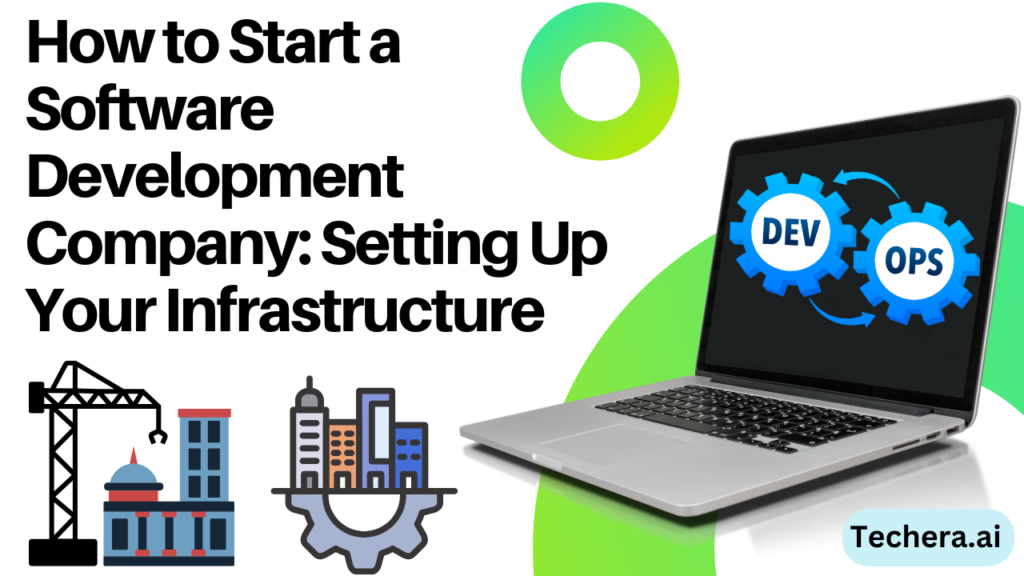
This blog post, “How to Start a Software Development Company: Setting Up Your Infrastructure,” offers a comprehensive guide to building the essential foundation for a successful software business. It covers critical aspects such as selecting the right hardware and software, leveraging cloud computing, ensuring cybersecurity, and optimizing your network. Designed for entrepreneurs, this article emphasizes scalable and cost-effective solutions to set up a robust infrastructure. The focus keyword “How to Start a Software Development Company” ensures the content is tailored to readers seeking actionable steps for launching their own software business.
Introduction
Setting up your infrastructure for a software development company is like laying the foundation of a house—it needs to be strong, reliable, and built to last. In this guide, we’ll walk you through every aspect of creating a robust infrastructure that ensures efficiency and scalability.
What Is Infrastructure in Software Development?
Infrastructure in software development refers to the hardware, software, networks, and systems required to build, test, deploy, and maintain applications.
Why Proper Infrastructure Is Essential for Success
Without proper infrastructure, your business could face issues like downtime, slow performance, and security breaches. A well-structured setup ensures smooth operations and boosts productivity.
Planning Your Infrastructure
Understanding Your Business Needs
Start by identifying your company’s specific requirements. Are you focusing on mobile app development, web solutions, or enterprise software? Your needs will dictate your infrastructure.
Choosing Between On-Premises and Cloud Infrastructure
Pros and Cons of On-Premises Setup
On-premises setups give you full control but require significant upfront investment and ongoing maintenance.
Benefits of Cloud-Based Infrastructure
Cloud infrastructure offers flexibility, scalability, and lower initial costs, making it ideal for startups.
Key Components of Infrastructure
Hardware Requirements
Servers, Workstations, and Networking Devices
Invest in high-performance servers and workstations to handle demanding software tasks. Ensure you have reliable networking devices for seamless connectivity.
Software Tools
Development Tools
Use IDEs like Visual Studio Code, Eclipse, or IntelliJ IDEA for coding. Include version control systems like GitHub or Bitbucket.
Collaboration Tools
Platforms like Slack, Microsoft Teams, and Zoom keep your team connected.
Also read : How to Start a Software Development Company: Tools and Technologies You Need
Security Software
Implement firewalls, antivirus software, and intrusion detection systems to protect your infrastructure.
Database and Storage Solutions
Choose robust databases like MySQL, PostgreSQL, or MongoDB and opt for cloud-based storage for scalability.
Cloud Computing in Software Development
Overview of Cloud Platforms
Popular cloud platforms include AWS, Google Cloud, and Microsoft Azure, each offering unique features for startups.
Setting Up a Scalable Cloud Infrastructure

Start small and scale as your business grows. Use cloud tools for automated resource allocation and cost management.
Benefits of Cloud for Startups
Cloud solutions are cost-effective, scalable, and offer advanced tools for software deployment and monitoring.
Security and Backup
Importance of Cybersecurity
Protect your company from cyber threats by implementing strong security measures like multi-factor authentication and encryption.
Best Practices for Data Backup and Recovery
Regularly back up your data and test recovery processes to ensure business continuity during outages.
Networking Essentials
Setting Up a Secure Network
Secure your network with VPNs, firewalls, and encrypted communication channels.
Optimizing Network Speed and Connectivity
Use high-speed internet and optimize your network settings to ensure uninterrupted workflows.
Budgeting for Infrastructure
Estimating Initial Costs
Account for hardware, software, cloud subscriptions, and IT support in your initial budget.
Managing Ongoing Expenses
Monitor costs regularly and optimize resource usage to stay within your budget.
Building a Strong Team
Hiring IT and DevOps Specialists
Hire experts who can set up and maintain your infrastructure effectively.
Training Employees on Infrastructure Usage

Provide regular training sessions to ensure your team uses the infrastructure efficiently and securely.
Scaling Your Infrastructure
When and How to Upgrade
Upgrade your systems when you outgrow your current setup or when new technologies emerge that offer significant benefits.
Adopting New Technologies
Stay ahead by integrating the latest tools and technologies, like AI-powered systems or advanced cloud features.
Conclusion
Infrastructure is the backbone of any software development company. By planning carefully and investing in the right tools, you’ll set your business up for long-term success. Don’t skimp on security, scalability, or training—these are the pillars that will support your growth.
Frequently Asked Question
Q. What is the best cloud platform for startups?
A. AWS, Google Cloud, and Microsoft Azure are all excellent choices, depending on your needs and budget.
Q. How much should I budget for infrastructure?
A. Initial costs can range from $10,000 to $50,000, depending on your scale and tools.
Q. How do I secure sensitive data in my system?
A. Use encryption, multi-factor authentication, and regular security audits.
Q. What tools are essential for collaboration in a software company?
A. Tools like Slack, Microsoft Teams, and project management platforms like Jira are invaluable.
Q. How often should I upgrade my infrastructure?
A. Review your infrastructure annually and upgrade as your business grows or as new technologies emerge.

